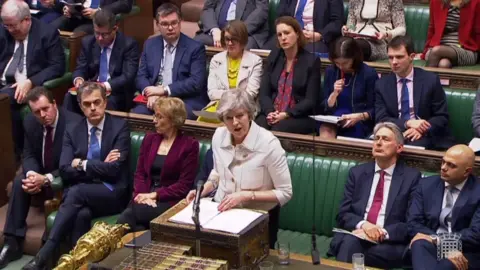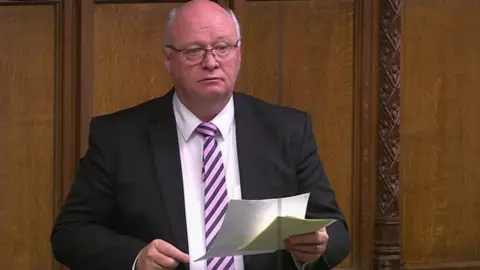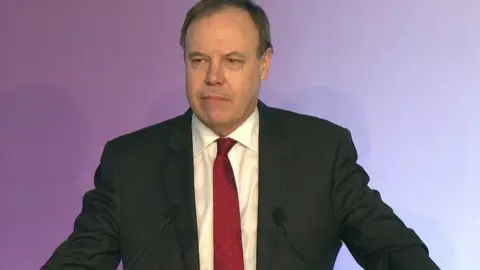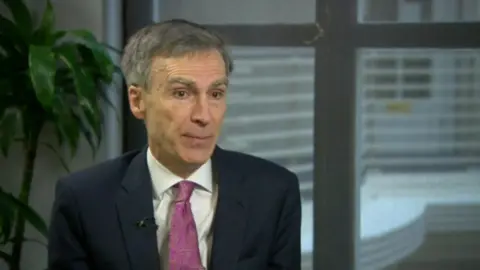Brexit: Theresa May warns no-deal Brexit could break up UK
 AFP/Getty Images
AFP/Getty ImagesIf MPs vote down the Brexit withdrawal deal in Parliament it could lead to the break-up of the United Kingdom, Prime Minister Theresa May has claimed.
She said a no-deal Brexit would "strengthen the hand" of those calling for an Irish border poll and a second referendum on Scottish independence.
An exchange of letters between the UK and EU offers more reassurances on the Irish border backstop, she said.
MPs are due to vote on the withdrawal agreement on Tuesday night.
'Sacrificial lamb'
But the DUP (Democratic Unionist Party), which opposes the backstop, said the letter offers nothing legally binding, and the party will still vote against Mrs May's plan.
As the deal was debated in the House of Commons on Monday night, DUP MP David Simpson said his constituents feel like "the sacrificial lamb to placate the Irish Republic and the EU".
The Upper Bann MP said that as a "proud unionist", he cannot support the withdrawal agreement.
"The way the EU has treated the fifth largest economy in the world is an insult," Mr Simpson told the Commons.
In the House of Lords, the prime minister's Brexit plan suffered its first official parliamentary defeat on Monday night, as peers registered their opposition.

While the Lords motion has no real power, peers voted to reject the deal by 321 votes to 152.
Earlier on Monday, the prime minister told MPs a no-deal Brexit would lead to "changes to everyday life in Northern Ireland that would put the future of the union at risk".
Mrs May has always insisted that her plan is the best deal to protect the union as a whole, but the DUP and opposition parties claim it poses a threat to the integrity of the union.
The DUP's Westminster leader Nigel Dodds asked the prime minister to "admit nothing has fundamentally changed" since she postponed a vote on the deal in December.
But Mrs May said the assurances had "legal force in international law" alongside the withdrawal agreement and political declaration, although she recognised "it's not what some members wanted from the EU".
Meanwhile, Ireland's tánaiste (deputy prime minister) said his country must "hold its nerve" this week as British MPs prepare to vote on the EU withdrawal deal.
 Pacemaker
PacemakerSimon Coveney warned against a "knee-jerk reaction" and said his government has been working for months on no-deal Brexit contingency planning.
Sinn Féin President Mary Lou McDonald said the EU backstop cannot be set aside or diluted.
"Whatever transpires at Westminster, it is essential that Irish interests are protected. That the economy is protected and that the Good Friday Agreement is protected in all its parts," she said.
What do the letters say?
The letter from Prime Minister Theresa May to the EU asks for clarity that in the event the UK and EU have negotiated but not yet ratified a trade deal, then the backstop would not be the "default" position and that all efforts would be made to avoid it.
The backstop, a mechanism that is included in the withdrawal agreement, is an insurance policy designed to avoid a hard Irish border "unless and until" another solution is found as part of the UK-EU future relationship.
The response from EU leader Donald Tusk and Jean-Claude Juncker states that the backstop is not the EU's preferred solution to avoiding a hard border.
Allow X content?
The letter also said that the backstop does not undermine the Good Friday Agreement, or "annex" Northern Ireland.
It also promised to consider alternative ways of preventing the need for physical checks on the border between Northern Ireland and the Republic of Ireland.
However, EU leaders said they are "not in a position to agree anything that changes" the legally binding withdrawal agreement, which was approved by the other EU27 leaders last year.
What has the Irish government said?
Speaking to Irish national broadcaster RTÉ, Tánaiste (Irish Deputy Prime Minister) Simon Coveney said the government needed to "tread carefully".
"People shouldn't feel threatened by it (the backstop), some people have painted the backstop into something that it's not," he said.
Allow X content?
"This week is going to be a really significant few days. This is a time where Ireland has to hold its nerve. We're most impacted by Brexit of all the EU states.
"We need to stay close to the British government and EU partners - but shouldn't respond in knee-jerked or any panicked way."
He said the Irish government had been working for months on no-deal Brexit contingency planning, and would circulate four detailed memos at a cabinet meeting on Tuesday, building on a previously released document.

Have the letters reassured the DUP?
Not at all.
The DUP has been saying for weeks that its 10 MPs will vote against the deal because of their opposition to the backstop, which would see extra checks for some goods coming into Northern Ireland from Great Britain, if it took effect.
The party believes any measure that could lead to differences between one part of the UK and the rest could threaten the integrity of the union.
Speaking on the BBC's Good Morning Ulster programme, before the letters had been published on Monday, the DUP's Westminster leader Nigel Dodds dismissed them as meaningless.
"When the prime minister delayed the vote in December, she said she was going to get legally binding reassurances," he said.
"A letter certainly isn't legally binding.
"It's another example that the EU is not prepared to do what's required, even to take the first step if it wants to get a deal in the House of Commons."
DUP leader Arlene Foster also renewed her assault on the backstop on Monday.
She said it "fundamentally undermines Northern Ireland's place in the UK" and "runs roughshod" over the principle of consent contained in the Good Friday Agreement.

Analysis: DUP not budging on backstop
By Jayne McCormack, BBC News NI Political Reporter
This is a last-minute letter for Theresa May to wave at her critics - but the party most vocally against the backstop is not budging.
A DUP source told me: "Unionists are far too long in the tooth to fall for written assurances."
Without a binding pledge from the entire EU27 that the backstop would be temporary, the DUP's view is that this letter has no effect on its voting intention.
It still wants to see the withdrawal agreement reopened and the backstop binned, or its terms changed.
Both these things look unlikely.
The DUP's problem with the backstop, as set out by Nigel Dodds, is three small - but important - words in the legally binding withdrawal agreement: "Unless and until."
While the backstop has its supporters - the Irish government, as well as other political parties in NI and business and farming groups - the scale of the opposition to it in Parliament at this late stage is likely to prove the downfall of Mrs May's deal.

What happens on Tuesday?
It is expected that about 100 Conservative MPs will join Labour and other opposition parties in voting against the deal on Tuesday night.
Theresa May has urged MPs to get behind her plan and has warned that not voting for it could mean not leaving the EU becomes a possibility.
She made a statement to MPs in Parliament on Monday afternoon and said, as a "proud unionist", she understood concerns about the backstop - and that once the withdrawal agreement was signed, immediate talks could begin with the EU in order to reach a trade deal and avoid entering the backstop.

The chair of Westminster's Northern Ireland Affairs Committee, Conservative MP Andrew Murrison, said that although he voted to leave the EU in 2016 he would back the plan.
He has tabled an amendment to the deal to create a "sunset clause", preventing the backstop extending beyond the end of 2021.
"It is important in my opinion that we understand the backstop is not needed to ensure the absence of a hard border in Northern Ireland," he said.
While the DUP is likely to vote against the deal, it will almost certainly back the prime minister if a no confidence motion is brought against her in Parliament.
Labour Party leader Jeremy Corbyn has vowed to table such a motion if the deal is defeated on Tuesday.
